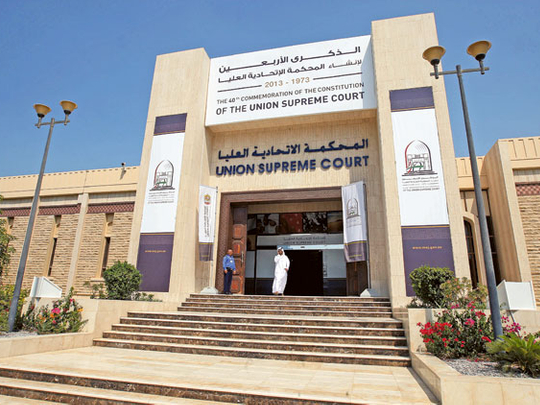
Abu Dhabi: The trial of nine men accused of establishing and running an Al Qaida-linked terrorist cell at the Federal Supreme Court was adjourned on Monday to June 9, when the defence lawyers will present their arguments.
At the beginning of the hearing, Chief Justice Falah Al Hajeri, read out a medical report about the health of the defendants, confirming they were subjected to no violence whatsoever during questioning.
Lawyers demanded the forensic doctor, who is currently out of the country, show up in person before the court at the next hearing for cross-examination.
The prosecution demanded the defendants be given life sentences for establishing and running an Al Qaida-linked terrorist cell, recruiting members and raising money for Jabhat Al Nusra, Arabic for Nusra Front, an Al Qaida-linked rebel group in Syria fighting troops loyal to President Bashar Al Assad.
Prosecutors also charged the men, all Arabs, with attempting to manufacture bombs, explosive belts, Molotov cocktails and light arms. The charges also include working out military schemes to attack certain sensitive facilities and conducting military combat training.
Five of the defendants are from Tunisia, two from Palestine, one from Jordan and one from Lebanon. A Palestinian, R.M.H., 44, who allegedly led the group, is being tried in absentia as he remains at large.
All eight defendants listened as Ahmad Al Danhani, Attorney-General at the State Security Prosecution, read out the indictment at the hearing.
‘Abu Obaida’ is the nickname of the Palestinian, R.M.H., 44, the leader of the group. Reports from electronics and criminal laboratories showed that electronic devices, mobile phones and memory cards collected as evidence contained invitations for ‘jihad’, in addition to creating a secret organisation that supports the ideologies of the banned Al Nusra organisation.
Among the evidence were files carrying instructions and 2,800 images on how to build home-made rockets, explosive belts, tasers, bombs and other explosives.
Based on the lab reports where the defendants’ electronic devices were examined, the judge also directed a charge of planning to train individuals in performing military services. Around 176 files containing information on building hand-made bombs and Molotov cocktails, in addition to military plans and tactics as well as ways to attack and practise self-defence, were found among the examined material.
Files highlighted
The court highlighted one file titled ‘Shaikh Bin Laden’ and another called ‘Mulla Omar’ which included methods for militarising men to perform tasks in Afghanistan, Pakistan and Syria. These files also had recommendations on how to lure youngsters, including Emiratis, to enrol.
However, all eight defendants denied the charges against them and said that they had been tricked by the main suspect, R.M.H., whom they claim used their personal electronic devices and mobile phones to store the illegal information without their knowledge.












